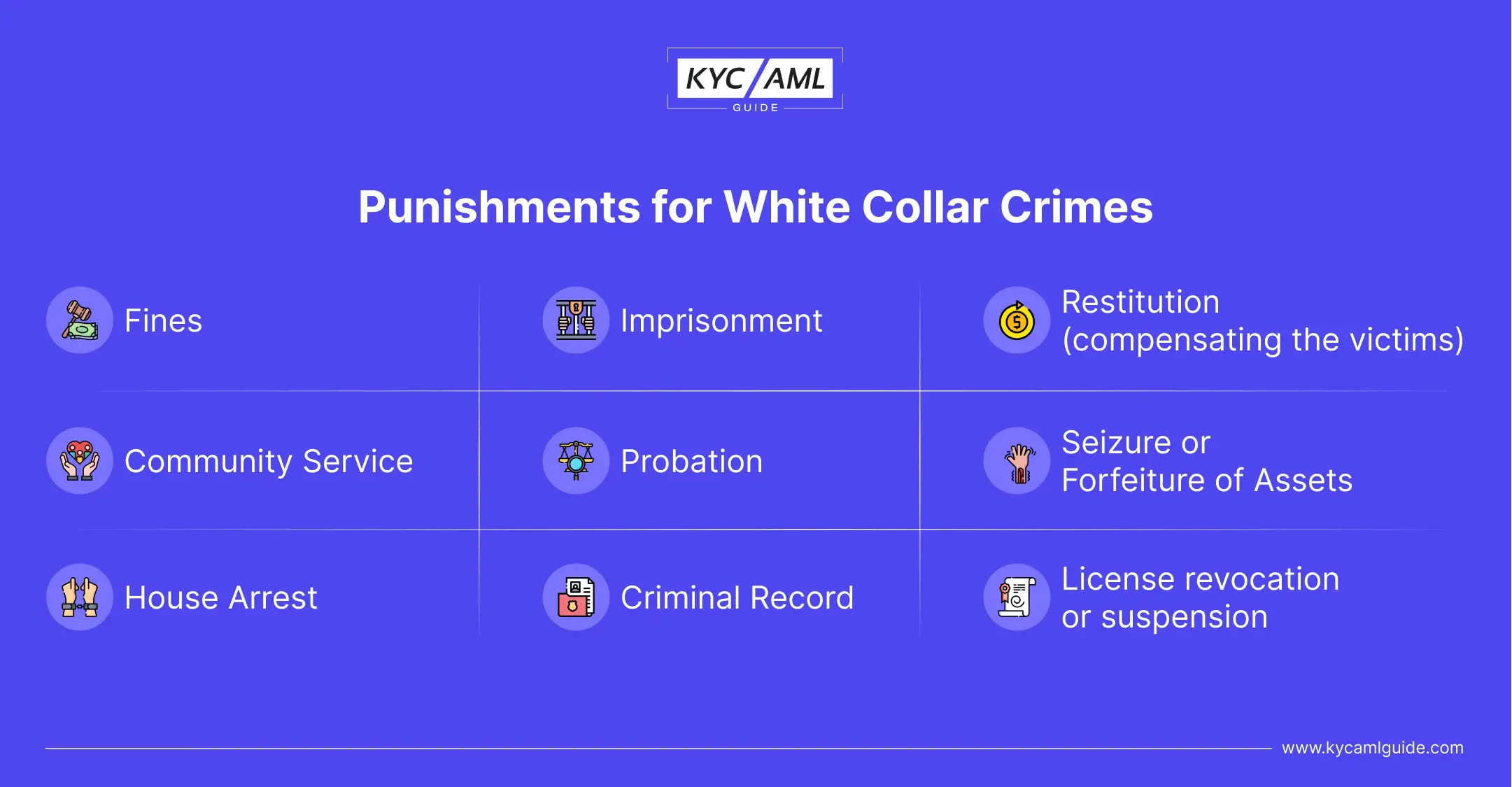What is White Collar Crime?
These are non violent crimes that post no direct lift threat to anyone. But the nature of white collar crimes can damage an entire economy by costing billions of dollars. Usually, they destroy public trust in financial institutions. Thus, White Collar crimes are not victimless rather they destroy the entire financial standing of a person or entity.
Examples of White Collar Crimes
Healthcare Fraud
Healthcare fraud is common in many countries. Medical healthcare providers, patients and other pharmacists decieve the health care system to recieve illegal benefits and payments. For example, a fraudulent patient might apply for medical claims.
Corporate Fraud
Corporate Fraud includes the following as major categories:
- Insider Trading
- Kickbacks
- Misuse of Property
- Tax evading or Tax violations
Money Laundering
Money Laundering is an illegal activity through which criminals turn their illicit money into legitimate funds. It is one of the most damaging white collar crimes in the world. Every year, billions of dollars goes into losses and Anti-money laundering activities due to Money Laundering white collar crime.
Identity Theft
Identity theft is a type of fraud through which unauthorized access to a person’s identity is misused for stealing cash or committing other serious crimes. This jeopardizes an innocent person’s social status and may cause him face serious consequences.
Other types of white collar crimes include:
- Intellectual Property Fraud
- Mortgage Fraud
- Financial Securities Fraud
Who Commits White Collar Crimes?
Mostly, Corrupt Government Officials, Businessmen and senior management are found guilty of commiting white collar crimes. The term white collar crime was first coined in 1939 which refers to as a criminal behavior shown by higher social class.
Read the Full essay: White Collar Crime
Who Works Against White Collar Crimes?
Primarily, FBI (Federal Bureau of Investigation) is the agency to investigate the white collar crimes in the USA and other jurisdictions. Currently, FBI is highly focused on the mitigation of Money Laundering as it becomes the basis of hiding the illicit cash.
How Money Laundering Facilitates other White Collar Crimes?
As explained above, Money Laundering is an illicit activity that facilitates the criminals in hiding their illegally earned cash. Money Laundering is carried out in three stages as:
- Placement
- Layering
- Integration
Criminal Proceeds generated through various illegal activities are hidden through Money Laundering. Typically it includes:
- Fraud
- Terrorist Activities
- Drug Trafficking
- Corruption
Different businesses are used for Money Laundering White Collar Crime such as:
- Banks & Financial Institutions
- Trade
- Real Estate
- Third Party service
- Virtual Currency (Crypto assets)
Criminals launder their money by investing in these legitimate businesses or by depositing small amounts of cash in bank accounts. The main goal is to make the illegal cash untraceable for regulators. Hence, It becomes a useful hide out for illegal cash.
Also Read: Embezzlement and Money Laundering
What are Punishments for White Collar Crimes?

It is important to note that severity of the punishments for white collar crimes differ as per jurisdictions. Also, the nature of the crime, regulations and criminal history matters alot while prosecuting a white collar criminal case. Following are some of the major punishments that a white collar criminal may recieve:
- Fines
- Imprisonment
- Restitution (compensating the victims)
- 4 Community Service
- Probation
- Seizure or Forfeiture of Assets
- House Arrest
- Criminal Record
- License revocation or suspension
What is Blue Collar Crime?
Blue collar crime refers to a crime which is committed by a lower social class person that includes sexual assault, murder or armed robbery. It is seriously violent in nature that can lead to both physical and financial harms to the society. Luckily, Blue Collar crimes are easier to detect as they have a clear victim. Blue Collar Criminals recieve severe punishments as well.
Blue Collar Crime vs White Collar Crime
It is not about comparing both crimes and suggesting which one is better. It is about the severity of the damage they can cause and the risk they pose to the society. Both blue collar crime and white collar crime are punishable. However, Blue collar crimes recieve severer punishment due to their violent nature. Moreover, Money Laundering is considered as a financial backbone of the entire criminal world. Outrightly, it supports the criminal activities and provides them financial refuge against the law enforcement worldwide.
How KYC and AML prevents Money Laundering White Collar Crime?
KYC (Know Your Customer) and AML (Anti-Money Laundering) are the most effective tools to combat money laundering. Robust KYC procedures ensure the customer’s authenticity and integrity whereas AML procedures ensure the prevention of Money Laundering activity in the financial transactions. Strong KYC and AML measures contribute in preventing Money Laundering and white collar crime due to the following factors:
- Identity Verification
- Monitoring of Suspicious Transactions
- CDD (Customer Due Diligence) and EDD (Enhanced Due Diligence)
- AML Training of Employees
Financial Institutions can create a strong line of defense against Money Laundering and White Collar Crimes. High-Risk Customers such as PEPs (Politically Exposed Persons) are identified and suspicious transactions are reported timely with latest methods of Compliance.
Conclusion
Money Laundering White Collar Crime fosters various illegal activities leading to dire consequences. White collar crimes are non-violent in nature but their after effects are quite damaging in the long run. To maintain a secure and seamless financial system, crimes like Money Laundering must be eliminated.





